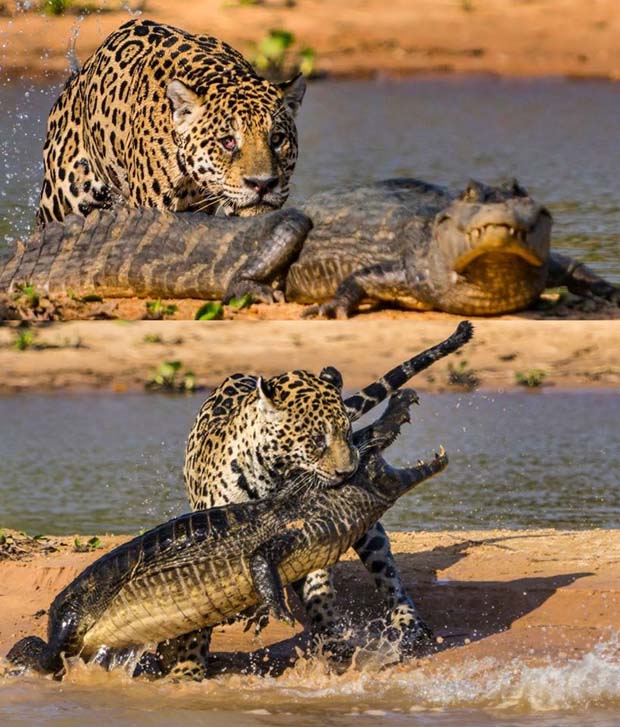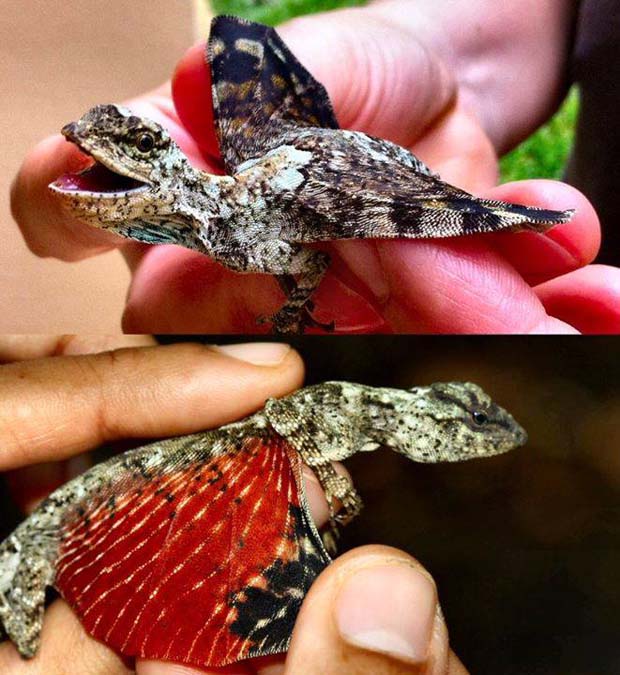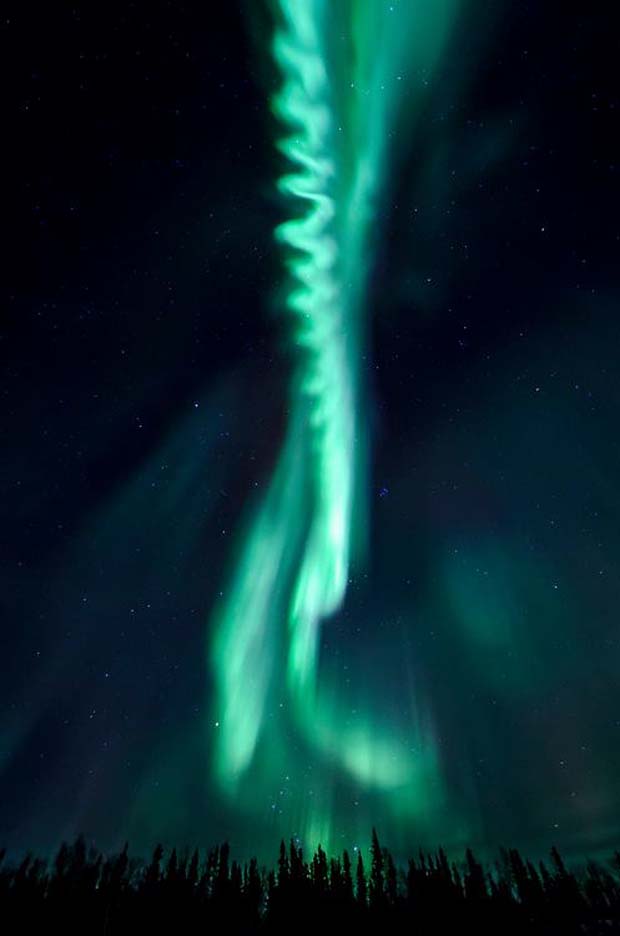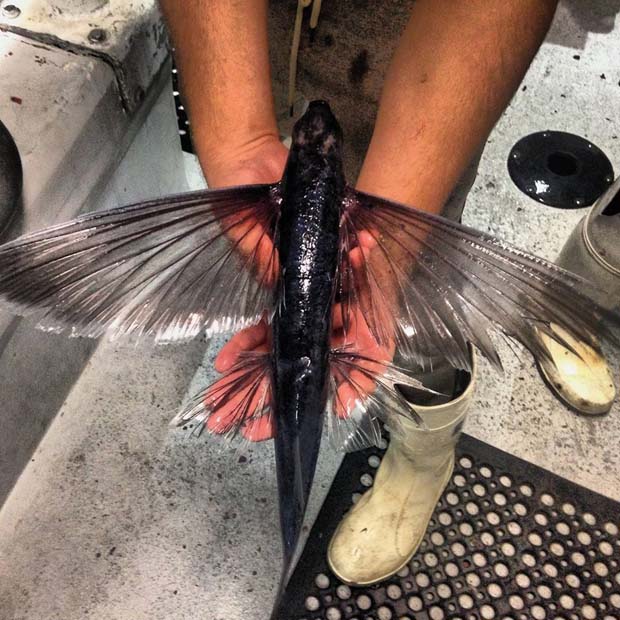
Sometimes we have to remind ourselves just how awesome Mother Nature is so here are 28 pictures that will do just that.
Mother Nature never fails to impress as shown in all these images.
Flying fish can make powerful, self-propelled leaps out of water into air, where their long, wing-like fins enable gliding flight for considerable distances above the water’s surface. This uncommon ability is a natural defense mechanism to evade predators.

Albino Humpback whale
Migaloo is an albino humpback whale that travels up and down the east coast of Australia and became famous in the local media on account of its extremely rare, all-white appearance. Migaloo is the only known all-white humpback whale.

Bismuth Crystals
Bismuth is a chemical element with symbol Bi and atomic number 83. Bismuth, a pentavalent poor metal, chemically resembles arsenic and antimony. Elemental bismuth may occur naturally, although its sulfide and oxide form important commercial ores. The free element is 86% as dense as lead. It is a brittle metal with a silvery white color when freshly produced, but is often seen in air with a pink tinge owing to surface oxidation.

Tasmanian Giant Crab (Pseudocarcinus Gigas)
– AKA “Giant Deepwater Crab” – One of the largest crabs in the world. – Weighs a mighty 29lb with a 15-inch shell. – It has a white shell with claws that are splashed in red.

Koroit Opal
Koroit Opal – Found In Australia, South West Queensland..

Kangaroo joey inside the pouch
FYI : Female kangaroos can determine the sex of their offspring. They can even delay gestation when environmental factors are likely to diminish the chance of young surviving.

Coolest Teeth Ever!
Crabeater Seal Teeth…

The Angel Of Death
Few seconds after the attack, the Owl left this AWESOME imprint on the snow.

Meteorite..
From a Violent Collision Comes Celestial Beauty – Amber inclusions of olivine in meteorite..

Jaguar Attacks Crocodile
Jaguar submerges itself in muddy river before it leaps out and pounces on eight-foot reptile then bites its neck and carries it away ‘like a doggie bone’. An amazing example of evolution, Jaguars have learned how to deal with Crocodiles with just a single bite!

Common Gliding Lizard (Draco Sumatranus)
“A lizard with elongated ribs and skin flaps on the sides of its body. When opened, these skin flaps allow it to glide between tree trunks. It is primarily a tree dweller, except that the females come down to the forest floor to lay eggs. The body length is of about 9 cm, with a slightly longer tail. The body is of a dark grey/brown colouration with stripes and patterns to help it camouflage against the tree trunks.”

Awesome shell dude!
Priotrochatella (Cuban Land Snail)

Human Blood Vessels
(Arteries of the Hand & the Lower Limb) Shanghai Science & Technology Museum, China

Purple Corn
A variety of zea mays, is a corn grown in the Andes region of South America. It is common in Bolivia, Ecuador, Peru. The kernels of Purple Corn have long been used by the people of the Andes to color foods and beverages, a practice just beginning to become popularized in the industrialized world. Besides its use as food and dye, purple corn is thought to have many health benefits.
Butterfly-fish (Dactylopteridae)
A flying gurnard (Dactylopterus volitans) in the Mediterranean east of Crete, Greece.

Underneath Waves
A stunning picture of waves crashing from underneath captured by photographer Mark Tipple on the Cook Islands, South Pacific Ocean.

Life Within Death
Physalis alkekengi, or the Chinese/Japanese Lantern, blooms during Winter and dries during Spring. Once it is dried, the bright red fruit is seen. The outer cover is a thin mesh that held the flower petals, seen in golden brown colour.

The Corpse Flower (Amorphophallus Titanum)
At 2.27 metres (7ft 5in) high, the Amorphophallus titanum is considered the largest flower in the world. Yup! It smells terrible..

Amazingly Beautiful Campo, Colorado
Most tornadoes have wind speeds less than 110 miles per hour (177 km/h), are about 250 feet (76 m) across, and travel a few miles (several kilometers) before dissipating.

The Glowing Forest, Shikoku, Japan
This forest glows in the dark thanks to a bunch of Luminescent Mushrooms. Mushrooms and fallen leaves emit a magical light for just a short period of time each year.

Opal
Koroit Boulder Opal…. Beautiful Patterns!

Katydid Nymph (Pseudophyllinae, Cymatomerini, Olcinia)
Insects in the family Tettigoniidae are commonly called katydids or bush-crickets. There are more than 6,400 species. Part of the suborder Ensifera, it is the only family in the superfamily Tettigonioidea. They are also known as long-horned grasshoppers, although they are more closely related to crickets and weta than to any type of grasshopper. Many tettigoniids exhibit mimicry and camouflage, commonly with shapes and colors similar to leaves.

The Dragon’s Skull
This weird little plant is called a Snapdragon or Dragon flower or, if you want to sound even smarter, The Antirrhinum. Once the flower has died, the seed pod begins to look like the skulls you see here. Apart from being creepy as hell and alleged protectors of the garden, if you wore this about your body you would appear to be more “fascinating and gracious”. Though I imagine if anyone actually did find this on you, fascinating and gracious are not the only things they will think about you.

Rains As Seen From An Airplane
Rain drops can fall at speeds of about 22 miles an hour. To take this into perspective, a snowflake falls at about 2-4 mph can take about 1 hour to finally reach the ground.

Unusual Colours
Red Bananas. Purple Carrots. Purple Corn.

Awesome!
Astronaut Karen Nyberg tweeted a photo of the Seven Sisters (Pleiades) overlooking Reunion and Mauritius islands in the Indian Ocean, taken aboard the International Space Station. Photo dated August 25, 2013.

Aurora…
Aurora Zipper, Yellowknife

Flying Fish (Parexocoetus Brachypterus)
Exocoetidae is a family of marine fish in the order Beloniformes of class Actinopterygii. Fish of this family are known as flying fish. There are about sixty-four species grouped in seven to nine genera. Flying fish can make powerful, self-propelled leaps out of water into air, where their long, wing-like fins enable gliding flight for considerable distances above the water’s surface. This uncommon ability is a natural defense mechanism to evade predators.

Source: imgur.com - Sciencegeek100 Via True Activist
Related Posts:
- World’s Only Documented All-White Humpback Spotted Off Sydney Coast
- Tiny Humans Lost In The Majesty Of Nature
- Life Finds A Way. 25 Plants That Just Won't Give Up
- 10 Reasons Why Nature is the Best Medicine
- Every Time I Think Nature Can’t Shock Me Any More, I Discover Something Like This. Wow.
- Norwegians Reactions To A Lonely Boy Out In The Cold Without A Jacket
- Sometimes Nature Is Awesome. Other Times, It’ll Scare The Life Out Of You. Like This.
- This is Simply Spectacular: Nature At Its Best. I Could Watch This Over and Over and Over Again.


0 comments:
Post a Comment